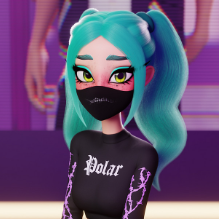A Critique of Digital Popstar Polar

Image via Spotify
December 7, 2022
The concept of a virtual musical artist is nothing new, one of the most popular examples would be 2-D from Gorillaz, a band formed in 1998, that has the voice of lead singer Damon Albarn. Another well-known example is the personification of a Japanese voicebank, Hatsune Miku, created in 2007. In recent years more and more things are being accessible without leaving our homes like shopping online, to streaming services, so it’d just make sense to create virtual entertainers as well. The Soul Publishing made its very own virtual popstar named Polar. Polar has a similar appearance to Hatsune Miku, with teal hair and matching eyes but with a more modern popstar outfit. Like 2-D, she has a person voicing her, not being fully computeristic like Miku. When Polar was released in 2021, she received quite a backlash. Why is it that a character so similar to two widely beloved fictional singers was met with so much hate from the audience?
The animosity towards Polar could be a mix of multiple different things, but most commonly it’s the purpose of her existence. Hatsune Miku, for example, is a tool that was made to be used by people who are musically inclined but without a vocalist to perform them, Hatsune Miku and many other Vocaloids have been used to make popular songs on the internet, if you’ve been online for long enough, you’ve more than likely heard bits of their music. Polar, on the other hand, doesn’t seem to have much of a purpose at all. All of her music is often criticized for sounding like it’s AI-generated, generic pop songs that you’d mindlessly hear on the radio and think nothing of for the rest of the day. Her only personality trait shown is how she’s “trendy” and a virtual singer. Miku was given a personality by her fans, but Polar can’t even receive one from her own creators.
Not only is Polar’s music deemed generic, but she herself is regarded as boring. Polar has no backstory, as she is “aware” that she isn’t real and just popped into existence. While this could not have presented as much of a problem, she has no discernable personality and no flaws other than feeling bad about herself for not being a real human girl. This is much unlike the two examples I’ve brought up, 2-D has his own backstory, flaws, and personality shown through music videos and lore, along with the rest of his bandmates making fans feel closer to them as if they were real celebrities. Miku also doesn’t have much of a story herself, but she is used as a tool to perform stories made by fans, the use of her as a creative outlet made fans emotionally attach themselves to her.
What separates Polar from the other virtual stars is that she lacks soul, she was simply made to get the attention of Gen Z with her E-Girl-like look and mask. The relatability they try to portray with her is incredibly ingenuine and she could’ve done without it if her music was, at the very least, able to stick with you.



































































































































